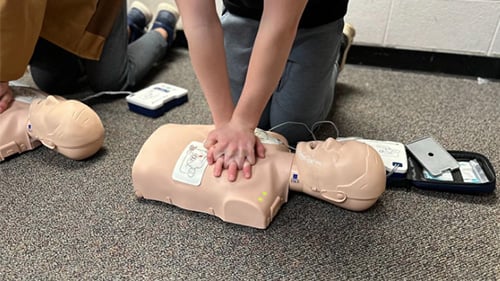Mental Health Awareness Month: You'd Be Home Now
May is Mental Health Awareness Month. It’s also the last full month of school for traditionally-scheduled districts. I think mental health is the...
AP & Honors Mathematics
Explore Wiley titles to support both AP and Honors mathematics instruction.
Literacy Skills & Intensive Reading
Connections: Reading – Grades 6–12
Empower student success with a proven intensive reading program that develops strong reading skills in striving readers.
Drama, Speech & Debate
Basic Drama Projects 10th Edition
Build students’ confidence and competence with comprehensive, project-based theatre instruction.
Literature
Connections: Literature
Support learners as they study dynamic, relevant texts and bring the richness of diverse voices to students through literature.
Literature & Thought
Develop critical thinking, reading, and writing across literacy themes, genres, historical eras, and current events.
Language Arts
Vocabu-Lit® – Grades 6–12
Help students build word power using high-quality contemporary and classic literature, nonfiction, essays, and more.
Connections: Writing & Language
Help students develop grammar, usage, mechanics, vocabulary, spelling, and writing and editing skills.
Reading/English Language Arts
Measuring Up to the English Language Arts Standards
Incorporate standards-driven teaching strategies to complement your ELA curriculum.
English Language Learners
Measuring Up for English Language Learners
Incorporate research-based best practices for ELLs with an approach that includes a focus on language acquisition strategies.
Mathematics
Measuring Up to the Mathematics Standards
Incorporate standards-driven teaching strategies to complement your mathematics curriculum.
Foundations
Measuring Up Foundations
Help students master foundational math skills that are critical for students to find academic success.
Science
Measuring Up to the Next Generation Science Standards
Give students comprehensive NGSS coverage while targeting instruction and providing rigorous standards practice.
Assessment
Measuring Up Live
Deliver innovative assessment and practice technology designed to offer data-driven instructional support.
For a better website experience, please confirm you are in:
Homework is unfair.
Not in the sense that you may hear students say (or you may have said yourself) that teachers give homework to be unfair for some reason. The vast majority of teachers—as with the vast majority of people—do things because they believe them to be the right thing to do. However, in working for education that allows opportunity for all students while still teaching what must be taught, homework too often falls into that complicated set of doing the wrong things for the right reasons.
A revision of that clickbait first sentence may more substantively look like this: homework creates an unfair situation for students.
Conversations with teachers reveal a few common rationales for homework:
With exception of the last item (addressed in more depth in a moment), none of these seem problematic… on the surface. Taking time to exercise new learning helps improve that learning. Students getting to work on a few things in class and then going home to work on those things independently relates to that. Reading of the book or watching the video to get into the content helps teachers move into that content and the learning around it. Writing drafts and then revising them based on what they have learned prove essentials skills in learning and showing what they have learned. Finally, students must get used to reviewing what they have learned and preparing to apply those things in ways that test their learning and knowledge.
So, given the first five item in this list, few people would doubt that most of these things make sense in schools.
Below the surface of those first five hides a damaging and regressive assumption: that all students doing these things are prepared, capable, and ready to do them without help. Some teachers see this problem already as the provide tutoring or corrections on the work. Such things seemingly allow students to learn from mistakes and grow in their content or skills, but when time for corrections or revisions becomes another homework assignment, then making a mistake, getting a wrong answer, or taking the time to revise something almost becomes punitive.
The last item comes up way too often and, though experiences says that the teacher likely means the homework serves one or more of the previously stated purposes, the fact that they make this statement belies the idea that homework can often take the place of true rigor and challenge in a classroom.
Homework is an education culture problem.
Almost everyone has gone to school and those who went to school have an expectation based on those experiences about what it means to be in school and what should be expected in school. That makes sense: anyone who spends 13-16+ years doing anything might well be considered nearly an expert in that thing. But this means that, by experience alone, most people accept or associate homework with education. Homework has become just one of those things we have to do or else. As such, most people just accept homework as part of schooling, with the perspective often being that “some students do their homework, some students do not; regardless, it’s their choice and in making that choice they determine how successful they will be.”
Ay, there’s the rub!
Accepting that perspective actually undermines the reasons for the homework given in the list above, even the last one. Many students do not have a choice about doing homework. Their home situations, level of ability, and/or other obligations all may interfere with their ability (not necessarily their willingness) to complete homework.
And this is where it becomes unfair: below the surface of the reasons listed, all of them assume both ability and understanding (and yes, though to a lesser extent than many may thing, willingness) to complete whatever has been assigned.
And assigning is not teaching.
Ultimately, homework creates a situation where school rewards the students who have the ability and capacity to do all of the homework assigned to them. This is not necessarily bad. The goal of school is learning and all that homework likely taught them something, so they should be rewarded for their learning. The unfairness comes in the form of the single parent who cannot take the time to sit with their students to review work or the educated parents who cannot help the student with their math assignment and who cannot afford a tutor or the student who rides a noisy bus 45 minutes in one direction who cannot concentrate on reading or the students involved in sports or band or something else who had their week planned and cannot just drop everything to do the review packet for the exam or the student who is the only English speaker in their house and must help manage things for their parents who want to support her school work but who struggle with just getting by.
When homework becomes too much of a delivery and practice tool, then the only really successful students are those who are already skilled in a subject, those who have means for tutors or other help, or those rare kids (admit it, you don’t know how they do it either) who are involved in everything and still get all of the homework done and make straight As.
Fixing homework will take some work.
So what are we to do? Admittedly, homework is so baked into the culture of our educational system and the public’s understanding of education that there cannot be a simple fix. Complex, systematic issues require complex and systematic approaches. Examination of the relationship between grades and homework and in-class work and growth/achievement is one place to start. Asking questions like:
The answers to these questions can help you recognize just how necessary or unnecessary the homework you are assigning may be to student learning and growth.
However, there are things that teachers can try tomorrow that can begin to make a difference.
Such steps in one classroom can become professional discussion points with colleagues and within departments and begin the longer journey toward cultural revision necessary to get closer and closer to an equitable education without upending the public’s understanding of what school is and does. These will also alleviate many of the problems that often come with homework: cheating, plagiarism, underworking, working with videos on, late night/early morning/hallway homework, etc.

May is Mental Health Awareness Month. It’s also the last full month of school for traditionally-scheduled districts. I think mental health is the...

Join Michael Guevara to discuss a strategy for letting students choose their own books to engage them in more texts. The books in this video were...

Light the menora, hang the mistletoe, and slip on your fuzzy socks—here are 6 YA books that will help get you in the holiday spirit!

We know who finishes books in two days and who avoids them altogether. We know which students rely on plot summary, which struggle with stamina, and...

December always asks a lot of us.

Like most kids ushered though elementary school in the days when the Charlie Brown holiday specials aired on television once a year and if you missed...

As a public educator, one of the most vital things that I try to get my students to understand is how all the information they learn works together...

Back in my hometown, it was a rite of passage at the age of twelve to get a paper route. There was no status associated with it, nor did it come with...

In the first blog post of the Rhetoric Meets Remedy series, I discussed the importance of teaching for transfer. Teaching for transfer is vital...

Walk into a middle school classroom during a lively literature circle and you’ll hear questions, laughter, debate, and—most important—learners...

"The “Words of Doom” were an addition to our spelling instruction in middle school ELA. They could easily be adjusted or modified for upper...

Although our middle school ELA students should have been capitalizing words like "I" since they were in early elementary school, many either just...

